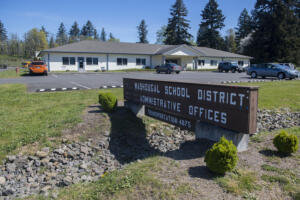After the Mount Pleasant School District’s Tuesday, March 19 board meeting, superintendent Vicki Prendergast and board president Karl Kanthak sat around a table nestled in a corner of a classroom at Mount Pleasant Elementary School and talked about some of the challenges that come with supervising a small, rural school district.
“When we’re getting audited from the state for federal programs and they’re saying, ‘You should put levy signs up in a store or gas station,’ I’m like, ‘There isn’t one,'” Prendergast said. “We have a cemetery. Do you want me to put up a sign in a cemetery?'”
“There’s nothing out here,” Kanthak said. “The actual point of social congregation is the transfer station – the dump. We could probably put a sign up at the dump. There is no other community congregation point in this district. There’s nothing but houses and (the school). The house at the bottom (of the hill) used to be a gas station, and across from there used to be the grange hall. Eighty years ago, this (area) had more commercial activity than it does now.
“(Because) there is no commercial activity in this area, we don’t have any businesses to tax. The whole thing is supposed to be run off of 100 households, basically.”
When a visitor looked out a window and pointed to several cows that were grazing near the school’s athletic fields, Prendergast and Kanthak laughed.




